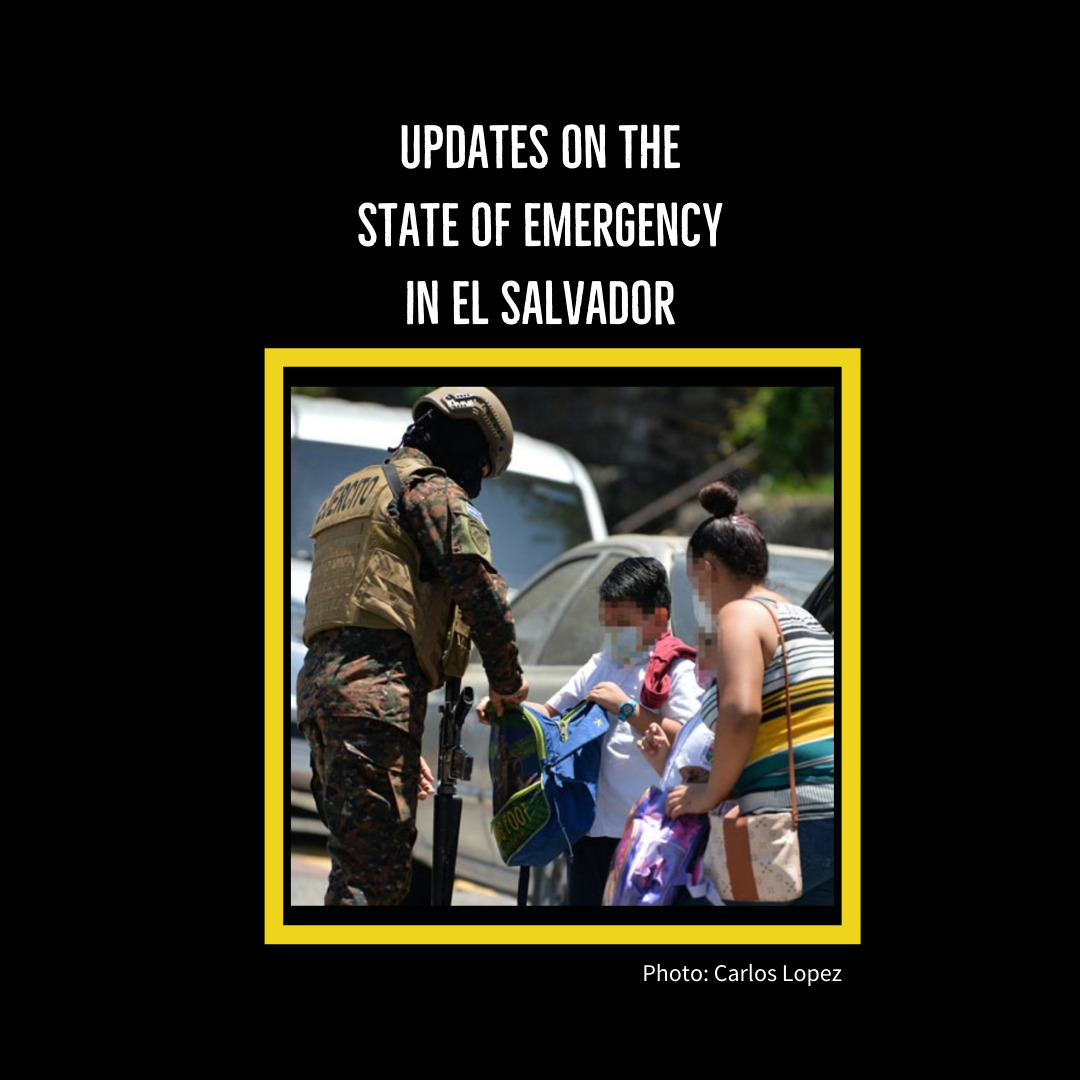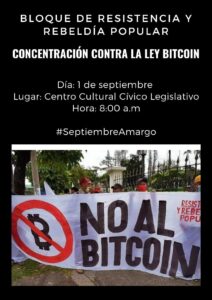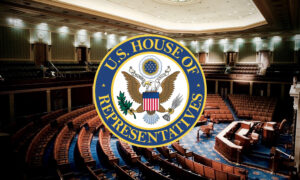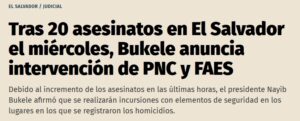Human Rights, News from Communities, Rights for Youth and Women
Update on the state of emergency in El Salvador / Estado de excepción en El Salvador
(EN ESPAÑOL ABAJO)
The Salvadoran government headed by Nayib Bukele declared a state of emergency on March 27, 2022 after 87 murders took place throughout El Salvador. The situation has called into question the effectiveness of the famous Territorial Control Plan, whose phases have never been fully explained to the population. The president pressured the previous legislation for funds to execute its second phase, for which the legislative assembly was seized accompanied by the military and the president’s supporters on February 9, 2020.
This is not the first time that the famous plan has been called into question. During the mandatory quarantine due to COVID-19, there was another spike in homicides. Several journalists have reported that this government, like the previous ones, has made a pact with the gangs and that is the real reason why Bukele has managed to reduce homicides to historic levels. Another important detail is that the Salvadoran government has refused to extradite two gang leaders to the United States.
VANGUARDIA reports: “The rights that Congress has suspended are freedom of assembly and association, the right to legal assistance, and the inviolability of correspondence. It has also suspended the prohibition of the intervention of telecommunications without judicial authorization and has extended the period of administrative detention to 15 days, when it is normally 72 hours. The authorities authorized to apply the measures have been the Ministry of Security, the National Civil Police and the Ministry of Defense.”
Las medidas a tomar serán implementadas por las instituciones pertinentes y anunciadas solo cuándo sea necesario.
Para la inmensa mayoría de personas, la vida continúa normal.
Dios nos bendiga a todos.
— Nayib Bukele (@nayibbukele) March 27, 2022
Although the president said that “for the vast majority of people, life continues normal”, the reality is different and, as in previous versions of “Manos Duras”, numerous arrests were made and various abuses have been reported:
Walter Sandoval
Walter died after being beaten by the police when they captured him: “They ended up killing him. We are worried that anyone can take us”
Agents injured him during his arrest and he died, according to the Forensics Institute, from severe blunt chest trauma. A police source said that: “what they (headquarters) are asking us for are arrests, regardless of the fact that sometimes we are a little unfair, so we must attribute the crime of illegal groups to all of them.”
A video of abuse
Minutes after being deleted by the official Police Twitter account, (a) video was reposted by @TERROR_SV with the message “mercy???”. At 3:22 p.m., the deputy of the Gana party, Guillermo Gallegos, replied to the tweet from that other account with the following message: “the terrorist is a cowardly being.” Gallegos is a politician who for years has proposed a reform of the Constitution to approve the death penalty, and starred, along with Nayib Bukele, in the military takeover of the Legislative Assembly on February 9, 2020
Roselia Rivas
Human rights defender Roselia Elvira Rivas Alfaro, president of the Community Development Association (ADESCO) in the Terciopelo community in Jiquilisco, Usulutan, was beaten, handcuffed and detained by the Police and the Army on Tuesday, March 29, 2022, according to reports of the Salvadoran Network of Human Rights Defenders.
The organization reports on its social media that Roselia was resting at home when five policemen and three members of the armed forces arrived, and seeing that there were many of them and that they got off the patrol, she began to record everything with her cell phone. while walking out of his house.
Seeing this, a police officer threatened her for recording and took her cell phone from her. Afterwards, she threw her on the floor while saying: “If you want, I’ll keep hitting you.”
(Coverage of the same case by YSUCA)
A colleague was recently harassed by female army personnel, who questioned her for having a tattoo regardless of its size or design. In Zaragoza (La Libertad), many houses have been searched. In Chalatenango, people have been reassured that they can continue to meet “as long as they don’t speak ill of the government.”
Other people have made their complaints through social media:
Condenable..!
Conozco el caso de un jornalero agrícola de 50 años aprox., quien fue arrestado y sus dos hijas, una de ellas en estado avanzado de embarazo, sufrió un aborto, esta hospitalizada, víctima de una golpiza x parte de agentes de la PNC por defender a su Papá… https://t.co/hZZPFPxASK— Elsa Lopez (@ElsaLop2018) April 5, 2022
And civil society organizations have shared the institutions people can reach out to if their rights are violated:
🚨 Ante las detenciones arbitrarias por el régimen de excepción, el colectivo La Comuna comparte el siguiente hilo con el contacto de organizaciones a las que se pueden acudir para la defensa de derechos humanos.
Invitamos a organizaciones a sumar contactos por este medio.— Resistencia Activa: LA COMUNA 🏳️🏳️🌈 (@lacomunaresiste) March 31, 2022
Bukele has spoken out in the face of these remarks, saying:
“The NGOs need a bloodbath to be able to criticize, because that is what they live for, that is what they are for, that is why they have been created. But it depends on us if we want to free ourselves from the protectors of the criminals, from the terrorists themselves.”
"Las ONGs necesitan que haya baño de sangre para poder criticar, porque de eso viven, para eso son, por eso han sido creadas. Pero de nosotros depende si nos queremos liberar de los protectores de los criminales, de los mismos terroristas", Presidente @nayibbukele. pic.twitter.com/NsZA8DEiNu
— Casa Presidencial 🇸🇻 (@PresidenciaSV) April 5, 2022
The most recent decision of the government is to try to control the information that is shared on these issues, through a reform of the penal code.
EFE and Telemundo report: The reform (…) establishes sentences of 10 to 15 years in prison for those who “produce, participate in its preparation, facilitate or manufacture texts, paintings, designs, drawings, graffiti or any form of visual expression that alludes to to the different gangs.
Today the Association of Journalists of El Salvador (APES) released a statement which reads:
The approved reforms also cover radio, television, written and digital media that “reproduce and transmit messages or communications originating or allegedly originating from said criminal groups.” In other words, he threatens media and journalists who report on a reality that, from the current administration, obsessed with propaganda and misrepresentation, seeks to hide.
From APES we consider these reforms as a clear attempt to censor the media. Prohibiting journalism from reporting the reality of thousands of people who live in communities controlled by gangs will not have any effect on people’s lives, but rather will create a mirage that is not true. Not mentioning the gangs won’t make them go away either.
(…)
It is worrying, therefore, that these reforms are approved by a Legislative Assembly that does not have the capacity to discern what the Presidential House orders of it, with a State without constitutional guarantees and with disrespect for the laws and the Constitution as a regular mode of operation.
We will have to see if the eyes of the international community create pressure before these new measures. USESSC will share with you the reactions of the Salvadoran social movement to these events.
Read THE GUARDIAN’s coverage of the situation in El Salvador here.
El Salvador 🇸🇻
"Nacer con cariño" y crecer en… pic.twitter.com/R6CzjRXugP
— 🆑Carlos López ♓️ (@HernandezJC_81) March 29, 2022
El gobierno de Nayib Bukele declaró un estado de excepción el 27 de marzo de 2022 tras varios repuntes de violencia en todo El Salvador que dejaron un saldo de 87 muertos. La situación ha puesto en entredicho la eficacia del famoso Plan Control Territorial, cuyas fases nunca han sido explicadas en su totalidad a la población. El presidente presionó por fondos a la legislación anterior para ejecutar la segunda fase del mismo, para lo cual se tomó la asamblea legislativa acompañado de militares y de sus seguidores un 9 de febrero de 2020.
Esta no es la primera vez que el afamado plan queda en entredicho. Durante la cuarentena obligatoria por motivos de COVID-19, hubo otro repunte de homicidios. Varios periodistas han afirmado que este gobierno, como los anteriores, ha hecho un pacto con las pandillas y es esa la verdadera razón por la que Bukele ha logrado que los homicidios bajen a niveles históricos. Otro detalle importante es que el gobierno salvadoreño se ha negado a la extradición de dos líderes de pandillas a los Estados Unidos.
VANGUARDIA reporta: “Los derechos que ha suspendido el Congreso son la libertad de reunión y asociación, el derecho a la asistencia letrada y la inviolabilidad de la correspondencia. También ha suspendido la prohibición de la intervención de las telecomunicaciones sin autorización judicial y ha ampliado el plazo de detención administrativa a 15 días, cuando normalmente es de 72 horas. Las autoridades autorizadas para aplicar las medidas han sido el Ministerio de Seguridad, la Policía Nacional Civil y el Ministerio de Defensa.”
Las medidas a tomar serán implementadas por las instituciones pertinentes y anunciadas solo cuándo sea necesario.
Para la inmensa mayoría de personas, la vida continúa normal.
Dios nos bendiga a todos.
— Nayib Bukele (@nayibbukele) March 27, 2022
Aunque el presidente dijo que “para la inmensa mayoría de personas, la vida continúa normal”, la realidad se muestra diferente y, como en las versiones anteriores de “Manos Duras”, se hicieron numerosas capturas y se han reportado varios abusos:
Walter murió tras ser golpeado por policías cuando lo capturaron: “Lo terminaron matando. Estamos con esa aflicción de que a cualquiera nos puede llevar”
Agentes le causaron lesiones durante su arresto y falleció, según IML, por un trauma cerrado de tórax severo. Una fuente policial dijo que: “ellos (jefaturas) lo que nos están pidiendo son números de capturas, sin importar que a veces seamos un poco injustos por lo que debemos atribuirles el delito de agrupaciones ilícitas a todos”.
Minutos después de haber sido eliminado por la cuenta oficial de la Policía, (un) video fue retomado por la cuenta @TERROR_SV con el mensaje “misericordia???”. A las 3:22 p.m., el diputado del partido Gana, Guillermo Gallegos, replicó el tuit de esa otra cuenta con el siguiente mensaje: “el terrorista es un ser cobarde”. Gallegos es un político que por años ha propuesto una reforma de la Constitución para aprobar la pena de muerte, y protagonizó, junto a Nayib Bukele, la toma militar de la Asamblea Legislativa el 9 de febrero de 2020
La defensora de derechos humanos Roselia Elvira Rivas Alfaro, presidenta de la Asociación de Desarrollo Comunal (ADESCO) en la comunidad Terciopelo de Jiquilisco, Usulután, fue golpeada, esposada y detenida por la PNC y la Fuerza Armada el martes 29 marzo 2022, según reportó la Red Salvadoreña de Defensoras de Derechos Humanos.
La organización relata en sus redes sociales que Roselia estaba descansando en su casa cuando cinco policías y tres miembros de la fuerza armada llegaron, y al ver que eran muchos y que se bajaban de la patrulla, ella comenzó a grabar todo con su teléfono celular, mientras caminaba hacia afuera de su casa.
Al ver esto, una agente de la policía la amenazó por estar grabando y le arrebató el celular. Después, la tiró al piso mientras le decía: “Si querés, te sigo pegando”.
(Cobertura del mismo caso por YSUCA)
Una compañera fue recientemente acosada por personal femenino del ejército, quien le cuestionó por tener un tatuaje sin importar el tamaño o diseño. En Zaragoza (La Libertad), muchas casas han sido cateadas. En Chalatenango, se ha tranquilizado a las personas asegurándoles que pueden continuar reuniéndose “con tal de que no hablen mal del gobierno”.
Otras personas han hecho sus denuncias por redes sociales:
Condenable..!
Conozco el caso de un jornalero agrícola de 50 años aprox., quien fue arrestado y sus dos hijas, una de ellas en estado avanzado de embarazo, sufrió un aborto, esta hospitalizada, víctima de una golpiza x parte de agentes de la PNC por defender a su Papá… https://t.co/hZZPFPxASK— Elsa Lopez (@ElsaLop2018) April 5, 2022
📌#EditorialArpas| ¿Quién defiende a las pandillas?
La ofensiva militar y policial que el gobierno mantiene desde hace una semana contra una de las principales pandillas está acompañada de un discurso que descalifica y estigmatiza a cualquier persona u organización pic.twitter.com/cn3RXaLben
— Red Informativa de Arpas (@arpassv) April 4, 2022
Y organizaciones de la sociedad civil han compartido instancias a las cuales pueden acudir quienes vean sus derechos vulnerados.
🚨 Ante las detenciones arbitrarias por el régimen de excepción, el colectivo La Comuna comparte el siguiente hilo con el contacto de organizaciones a las que se pueden acudir para la defensa de derechos humanos.
Invitamos a organizaciones a sumar contactos por este medio.— Resistencia Activa: LA COMUNA 🏳️🏳️🌈 (@lacomunaresiste) March 31, 2022
Bukele se ha manifestado ante estos señalamientos, diciendo:
“Las ONGs necesitan que haya baño de sangre para poder criticar, porque de eso viven, para eso son, por eso han sido creadas. Pero de nosotros depende si nos queremos liberar de los protectores de los criminales, de los mismos terroristas”.
"Las ONGs necesitan que haya baño de sangre para poder criticar, porque de eso viven, para eso son, por eso han sido creadas. Pero de nosotros depende si nos queremos liberar de los protectores de los criminales, de los mismos terroristas", Presidente @nayibbukele. pic.twitter.com/NsZA8DEiNu
— Casa Presidencial 🇸🇻 (@PresidenciaSV) April 5, 2022
La decisión más reciente del gobierno es intentar controlar la información que se comparte sobre estos temas, a través de una reforma al código penal.
EFE y Telemundo reportan: La reforma (…) establece penas de 10 a 15 años de cárcel para quienes “elaboren, participen en su elaboración, facilitare o fabricare textos, pinturas, diseños, dibujos, grafitis o cualquier forma de expresión visual que haga alusión a las diferentes agrupaciones”.
Igual sanción se aplica a medios de comunicación radial, televisivo, escrito o digital que “reproduzcan o transmitan” mensajes de pandillas.
La Asociación de Periodistas de El Salvador (APES) se pronunció hoy sobre la misma:
Las reformas aprobadas también abarcan a los medios de comunicación radiales, televisivos, escritos y digitales que “reproduzcan y transmitan mensajes o comunicados originados o presuntamente originados por dichos grupos delincuenciales”. Es decir, que amenaza con cárcel a los medios de comunicación y periodistas que reporten sobre una realidad que, desde la actual administración, obsesionada con la propaganda y la tergiversación, se busca esconder.
Desde APES consideramos estas reformas como un claro intento de censura a los medios de comunicación. Prohibir al periodismo reportar la realidad que viven miles de personas que habitan en comunidades controladas por pandillas no surtirá ningún efecto en las vidas de las personas, sino que creará un espejismo que no es fiel a la verdad. No mencionar a las pandillas tampoco las hará desaparecer.
(…)
Preocupa, por tanto, que estas reformas sean aprobadas por una Asamblea Legislativa que no tiene la capacidad de discernir lo que Casa Presidencial le ordena, con un Estado sin garantías constitucionales y con el irrespeto a las leyes y la Constitución como modo habitual de operación.
📢#Comunicado #PorLaLiLibertadDeExpresión Periodistas y Comunicadores Independientes de Nicaragua nos solidarizamos con la prensa de investigación salvadoreña ante la aprobación de Ley Mordaza. 📝@PVacaV @RELE_CIDH @RSF_esp @CPJAmericas pic.twitter.com/kjFQDk42FU
— Periodistas y Comunicadores de Nicaragua (@PeriodistasNica) April 6, 2022
Habrá que ver si los ojos de la comunidad internacional crean presión ante estas nuevas medidas. Ciudades Hermanas compartirá las reacciones del movimiento social salvadoreño ante estos acontecimientos.
Haga clic en los enlaces para leer la cobertura de CNN y DW sobre este tema.




